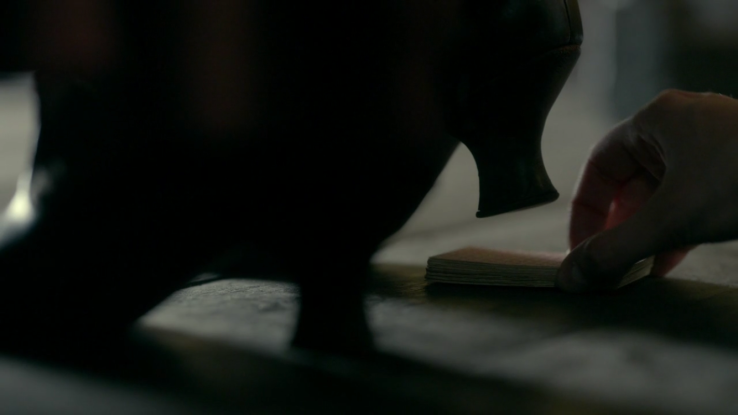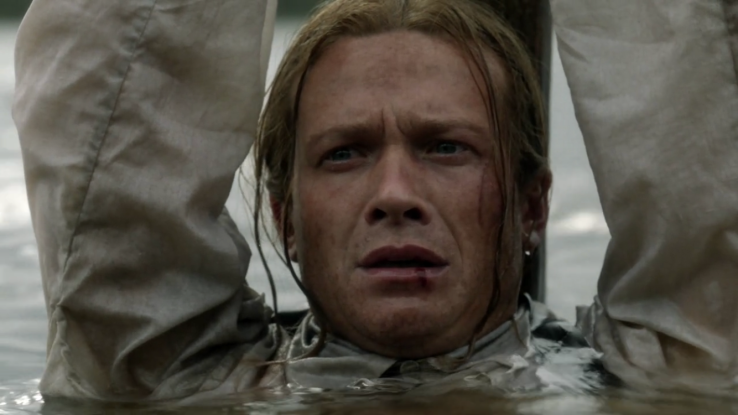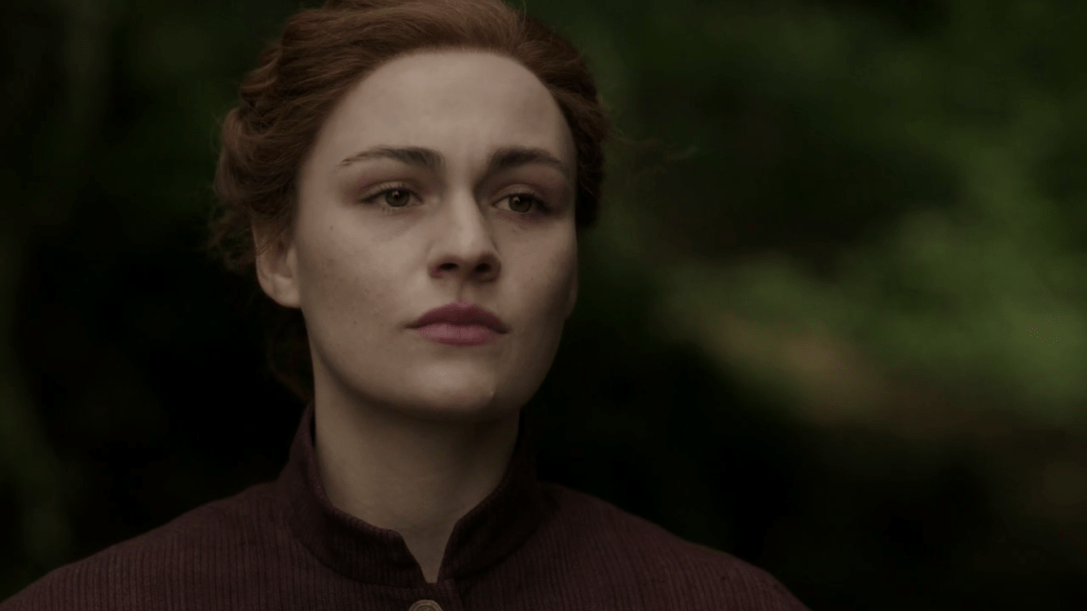Call me Ishmael, friends. Let’s break this down.
Warning- Contains spoilers from Outlander Episode 510: Mercy Shall Follow Me

The Lord is my shepherd, I shall not want.
Psalm 23, invoked in this episode’s title, is one of the most recognized passages in the Bible. Sometimes considered one of the “pastoral” psalms, it likens God to a shepherd tending over His flock– He cares for us, leads us to safety, and our trust in Him ensures that we will be well-tended in this life and the next. And so it is no surprise that a prominent theme of this episode is provision: Bonnet’s twisted notion of fatherhood, Jocasta’s inheritance, and Brianna’s ultimate act of mercy (which exists regardless of her intention). Both the plot and subplot in this episode focus on what one character provides (or hopes to provide) to another.

But beyond provision, the psalm also alludes to death and what follows death when we have faith in the Lord: peace and truth. Mercy and goodness shall follow us all the days of our lives, and we shall dwell in the house of the Lord forever.

And perhaps this is the theme to which we should pay most attention, because it ties in beautifully with the other prominent influence in this episode– that of Herman Melville’s Moby Dick. As Ishmael, the novel’s narrator, reflects: “Our souls are like those orphans whose unwedded mothers die in bearing them: the secret of our paternity lies in their grave, and we must there to learn it.” With death, the novel seems to argue, comes truth and with that truth also comes peace. For Bonnet, the orphan in this episode, this does seem to be the case. In his final moments, as the water closes in, someone does come from him and ends his nightmare. For a brief moment we see this revelation flicker across his face– a fleeting glimpse of humanity’s truth. The mercy follows.

There are endless interpretations of Moby Dick and we can derive any number of themes from the novel depending on where we choose to look: nature versus mankind, revenge, free will, etc; reading and analyzing Moby Dick are exercises in subjectivity. And like one’s analysis of the novel, the actions of our characters in this episode are also ambiguous. Is Bonnet at all sincere or just a master manipulator? Is Jocasta truly generous or is she testing Forbes’s loyalty? Does Brianna act out of mercy or revenge or closure? Is Ahab a victim or a predator? The answers vary depending on who is “reading” the story.

As Brianna speculates, stories are driven by three main motivators: love, greed, or revenge. These forces serve as the proverbial doubloons nailed to the Pequod’s mast. And so it is for our characters in this hour, in search of their respective “white whales:” the family hunts for Bonnet, Bonnet pursues Brianna and Jem, and Forbes seeks a fortune. Like Ahab, they pin the fruition of their dreams on their ability to capture what eludes them: closure, status, wealth.

Upon reading Moby Dick, there is the inevitably a discussion of nature versus mankind and humanity’s constant need to contain it. Captain Ahab sees the white whale as his nemesis, a being with an agenda who similarly seeks revenge. But Moby Dick is nothing more and nothing less than what he simply is: a whale. The whale is a part of nature, and nature remains wholly indifferent to the emotions and wishes of man. And so, in this episode, the waves continue to crash upon the shore as Claire lies injured in the sand. The beach continues to exist, disinterested in Brianna’s abduction. The tides continue to rise, regardless of the men drowning on their posts. Bonnet fears that the ocean is hungry for souls…his soul, to be exact…but the ocean has no agenda. It simply is.

And ultimately what separates man from nature is our lack of indifference. We extend mercy to those who don’t deserve it. We step in to protect each other. We are motivated by purely human emotions: revenge, greed, love. As Claire tells Eppie, we assist others when we see a need. We help others achieve equal footing, both literally and figuratively. We do not remain indifferent.
Moreover, we choose to have faith, believing in powers that we cannot see. In the abstract we envision a God who guides us to safer pastures…we put faith in a creator Whom we do not see as indifferent but rather Who we trust to walk with us through the valley of the shadow of death.

Perhaps this is what Bonnet realizes in his final moments, as his face transforms from one of panic into a sort of clarity. The surrounding water chokes him, indifferent to his fears. On the shore stands a woman, who couldn’t remain indifferent to him if she tried. Bonnet was a man without faith, and faith came for him in the end regardless.

And so it ends as it does in Moby Dick: a maniacal man is lost to the ocean. The tides keep rising, and the humans left behind continue the work of living and feeling. We seek those paths of righteousness, hoping mercy and goodness follow us all the days of our lives.
Slàinte.
p.s. I have no doubt this will be the episode submitted for Sophie Skelton’s Emmy nomination. What tremendous work, truly.


Another amazing intelligent analysis of episode 10!
LikeLike
Well done, this one and the last episode….certainly hope Diane reads these blogs, I think she would be totally honored~
LikeLike
It’s amazing how we all can watch the same episode and each of us sees something different. This scripture kept coming to mind as I watched this episode. I guess it’s because God’s grace and mercy keeps me on this side and will keep me when I pass to the otherside of life. In all of his evilness Bonnet gave Bree mercy, by not repeating his first sin upon her again. Bonnet recieved mercy because Bree took his live before he had to succumb to his fear.
Hopefully, Ulysses will find some form of mercy for taking Forbes life and the law imposed on slaves for taking a man’s life.
Finally, the Mackenzies and the Frasers were recieved mercy when they were told where Bonnet was to save their wife/daughter.
I really enjoyed reading your insight and take on this episode.
LikeLike